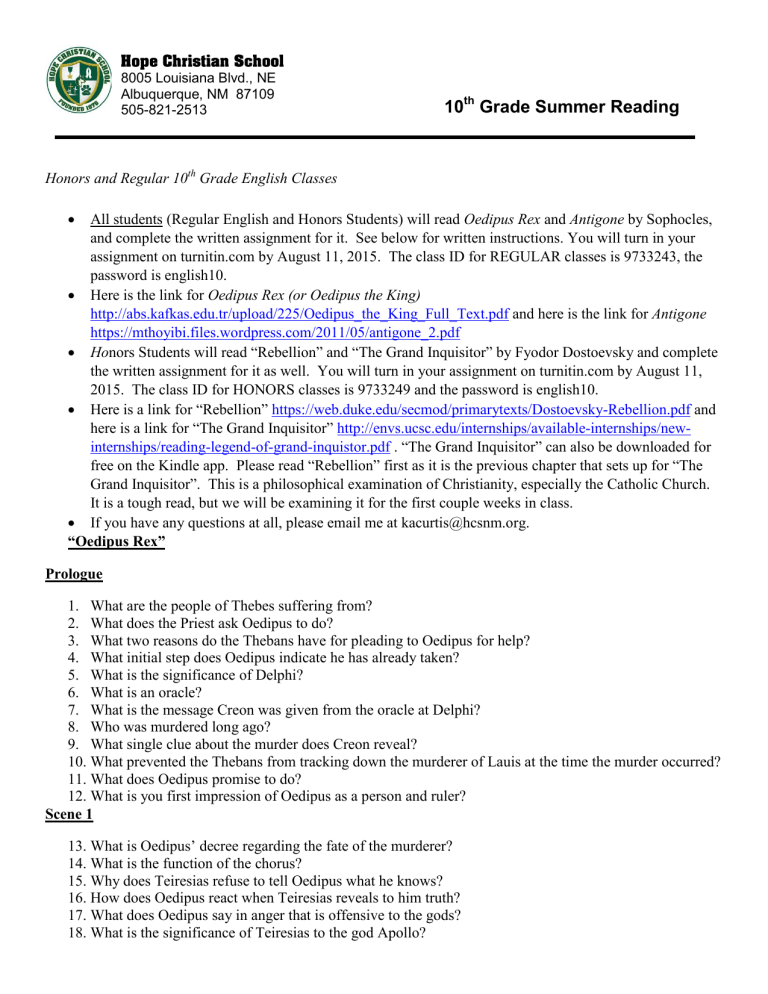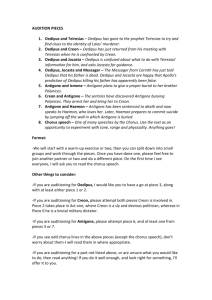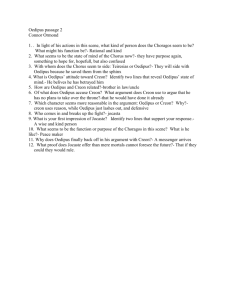10th Grade Summer Reading

8005 Louisiana Blvd., NE
Albuquerque, NM 87109
505-821-2513
10
th
Grade Summer Reading
Honors and Regular 10 th
Grade English Classes
All students (Regular English and Honors Students) will read Oedipus Rex and Antigone by Sophocles, and complete the written assignment for it. See below for written instructions. You will turn in your assignment on turnitin.com by August 11, 2015. The class ID for REGULAR classes is 9733243, the password is english10.
Here is the link for Oedipus Rex (or Oedipus the King) http://abs.kafkas.edu.tr/upload/225/Oedipus_the_King_Full_Text.pdf
and here is the link for Antigone https://mthoyibi.files.wordpress.com/2011/05/antigone_2.pdf
Ho nors Students will read “Rebellion” and “The Grand Inquisitor” by Fyodor Dostoevsky and complete the written assignment for it as well. You will turn in your assignment on turnitin.com by August 11,
2015. The class ID for HONORS classes is 9733249 and the password is english10.
Here is a link for “Rebellion” https://web.duke.edu/secmod/primarytexts/Dostoevsky-Rebellion.pdf
and here is a link for “The Grand Inquisitor” http://envs.ucsc.edu/internships/available-internships/newinternships/reading-legend-of-grand-inquistor.pdf
. “The Grand Inquisitor” can also be downloaded for free on the Kindle app. Please read “Rebellion” first as it is the previous chapter that sets up for “The
Grand Inquisitor”. This is a philosophical examination of Christianity, especially the Catholic Church.
It is a tough read, but we will be examining it for the first couple weeks in class.
If you have any questions at all, please email me at kacurtis@hcsnm.org.
“Oedipus Rex”
Prologue
1.
What are the people of Thebes suffering from?
2.
What does the Priest ask Oedipus to do?
3.
What two reasons do the Thebans have for pleading to Oedipus for help?
4.
What initial step does Oedipus indicate he has already taken?
5.
What is the significance of Delphi?
6.
What is an oracle?
7.
What is the message Creon was given from the oracle at Delphi?
8.
Who was murdered long ago?
9.
What single clue about the murder does Creon reveal?
10.
What prevented the Thebans from tracking down the murderer of Lauis at the time the murder occurred?
11.
What does Oedipus promise to do?
12.
What is you first impression of Oedipus as a person and ruler?
Scene 1
13.
What is Oedipus’ decree regarding the fate of the murderer?
14.
What is the function of the chorus?
15.
Why does Teiresias refuse to tell Oedipus what he knows?
16.
How does Oedipus react when Teiresias reveals to him truth?
17.
What does Oedipus say in anger that is offensive to the gods?
18.
What is the significance of Teiresias to the god Apollo?
19.
Whom does Oedipus assume is behind Teiresias’ claims?
20.
List 4 of the many prophecies Teiresias gives to Oedipus regarding the murderer of King Lauis.
Scene 2
21.
What two reasons does Choragos give Oedipus for believing Creon is innocent?
22.
What reasons does Oedipus give to prove that Teiresias is wrong?
23.
What does Creon argue to prove he is not guilty of treason?
24.
Why does Jocasta have no faith in the oracles of seers and prophets?
25.
Why does Oedipus suspect that Teiresias may have been right?
26.
What account from the shepherd may clear Oedipus’ name?
Scene 3
27.
Why does the messenger’s message make Jocasta so joyful?
28.
According to Jocasta, why should Oedipus have no fear of sleeping with his mother?
29.
What does the messenger tell Oedipus to prove that his fears are groundless?
30.
Why does Jocasta want the questioning to end?
31.
Why does Oedipus assume that Jocasta want the questioning to end?
32.
What clues does the messenger give that reveals the truth to Jocasta?
Scene 4
33.
Oedipus is about to interrogate the Shepherd. Which characters has he already cross-examined in an effort to solve the mystery of Laius’ murder and his own identity?
34.
Why do you think the Shepherd bursts in so angrily here?
35.
Who else in the play so far has called Oedipus “unhappy” because of his desire to learn more?
36.
Oedipus fails to experience recognition. What truths does he fail to see?
Exodos (The final scene)
37.
How does Jocasta die?
38.
As Oedipus stormed into the palace, do you think he intended to harm Jocasta?
39.
Explain what Oedipus does to himself.
40.
Why does Oedipus choose blinding himself rather than committing suicide? Explain whether or not this is an act of bravery or cowardice.
41.
Why does Oedipus wish for all of Thebes to see him in his present condition?
42.
What does the Choragos mean when he says to Oedipus, “You suffer it all twice over”?
Literary Terms
Apply these literary terms to the Greek tragedy, “Oedipus” by explaining each with an example from the play.
Use your notes.
43.
Hamartia: (Give an example of Oedipus’ character flaw.)
44.
Hubris: (Give an example of how Oedipus demonstrates excessive pride.)
45.
Recognition: (Does Oedipus achieve recognition or fail to do so? Explain.)
46.
Pathos (How do the events in Oedipus Rex evoke feelings of sympathy and pity in a reader?)
47.
Tragic Hero: (How does Oedipus exhibit the true qualities of a tragic hero? Why would he be considered a hero?
Directions:
The question underlining the play is this: Is Oedipus’ destructive end a result of a doomed fate by the gods or was it because of his character flaws?
To sufficiently answer this question, analyze each of Oedipus’ character flaws by explaining an example for his behavior and actions regarding each separate flaw.
48.
Proud
49.
Stubborn
50.
Pompous
51.
Judgmental
52.
Has a temper
53.
Give an example of the light/dark, blindness/sight motif throughout the play.
54.
How are these motifs used to reveal situational and dramatic irony in the play?
55.
Explain how these motifs reveal the central conflict of the play.
Antigone
1. The Prologue reveals a major conflict between which two characters? (Hint: It is the main conflict of the play)
2. What is Creon’s decree regarding Polyneices? Why does Antigone not agree with the decree?
3. Why does Antigone believe that Polyneices deserves a proper burial?
4. What personality traits make Ismene an effective foil for Antigone?
5. What does Creon say is possibly the motive behind burying Polyneices?
6. Which of these values is one Creon does not express? a. the stability of the state is most vital c. loyalty deserves respect and reward b. family loyalty always takes precedence over the state d. kings must show conviction and never be weak
7. What fundamental principle does Antigone proclaim in her confrontation with Creon? (Hint: It’s a theme of the play)
8. What are Antigone’s motives for defying Creon?
9 What is Creon’s motive for arresting Ismene?
10. How does Haimon try to persuade his father to change his position?
11. What does Haimon warn his father will happen if Antigone dies?
12. What does Creon believe the people of Thebes will think of him if he changes his mind to satisfy his son?
13. What does Antigone express regret over as she is being lead to her death?
14. How is Antigone to be put to death?
15. What does the Choragos tell Creon about Teiresias’ predictions?
16. What is Creon’s motive for finally wishing to free Antigone and bury Polyneices?
17. What does Haimon do just before killing himself?
18. How does Antigone die?
19. What does Eurydice do when she learns of her son’s death?
20. What lesson does Creon learn from this experience?
21. How are these themes illustrated in this play? (Hint: Give examples from the play)
-God’s law is above man’s law.
-Fate controls people’s lives.
-Pride causes great grief and pain.
23. How is Creon a dynamic character?
24. What is the definition of tragedy?
25. What characteristics define a tragic hero.
Word Bank:
Polyneices Oedipus
Teiresias Eteocles
Ismene Haimon
Chorus Eurydice Creon
Antigone Choragos
26. Which character is a blind prophet?
27. Which character is Oedipus’ son who was buried with full honors by the State?
28. Which character killed his father and married his mother? He is the father of Antigone.
29. Which character is the leader of the chorus?
30. Which character is the queen of Thebes?
31. Which character is engaged to Antigone? He is the son of Creon.
32. Which character took over as the King of Thebes after the war?
33. Which character refused to help her sister bury their brother Polyneices?
34. Which character is the ill-fated daughter of Oedipus? She defied the king’s decree.
35. Which character is considered a traitor to Thebes? His body was left to rot.
36. Which character is the group that sings and comments on the actions of the characters?
Word Bank (May be used more than once).
Prologue
Chorus
Stage Directions
Tragedy
Foreshadowing
Theme
Choragos
Irony
Conflict
Tragic Flaw
37. What is the scene that introduces the conflict of a Greek tragedy called?
38. Which element of drama is the “choreography” of the play that tells actors where to go on stage?
39. Antigone’s and Creon’s stubbornness is part of their _________________________.
40. Which character represents a group of Theban citizens who comment on the action and contribute to thematic development of this Greek tragedy?
41. A tragic hero, who must be a person of nobility, will experience a horrible downfall caused by their
_________________________.
42. What literary element hints at events that will happen later in the story?
43. The meaning behind the events of a story tell us the _______________________ of a story.
44. The fact that Teiresias is blind but sees the truth is an example of what literary element?
45. The major ____________________ of this play is deciding whether to follow Creon’s edict or the gods’ laws.
47. A _____________________, or underlying meaning of this story is that Fate controls, not men.
48. Hubris or Pride is the most common type of _____________________________.
49. Who is the leader of the chorus?
50. Which character wonders whether the gods were behind the burial of Polyneices’ body?
51. Hamartia is another name for a tragic hero’s _______________________________.
Honors Only: Please read the “Rebellion” and the “Grand Inquisitor” for this assignment. These questions are what we will discuss in class. If you are not sure on an answer, put your personal opinion as to what you think is being said. Please put page numbers for where you found your answers.
A.
“Rebellion”
1.
What do you think Ivan means by “Christlike love” on page 1?
2.
According to Ivan, what group of humans deserves Christlike love, and why?
3.
Who is absolutely undeserving of Christlike love?
4.
Identify aspects of (a) our world and (b) Christianity that make it impossible for Ivan to accept religion
(even if he claims not to reject God), and explain how Ivan plans to live out his life as a result of this view.
5.
Do you agree with Ivan’s views about the problems of the world and Christianity? Explain.
6.
With what term does Alyosha describe Ivan’s plan for his life, and what do you think that Alyosha means by this term?
7.
How does Dostoevsky link the narrative of “Rebellion” with that of “The Grand Inquisitor”?
B. “The Grand Inquisitor”
1.
What is the setting (time and place) of Ivan’s poem, what is an auto da fé , and who were the victims of these “acts of faith” during the Spanish Inquisition?
2.
What prompts the coming of Christ in Ivan’s poem, and is this coming the one prophesied in “Revelation”?
3.
Why does the Grand Inquisitor recognize Christ?
4.
According to the Grand Inquisitor, to whom did Christ abandon his power? What is the traditional
Catholic view toward the legitimacy of the views of this person to whom Christ abandoned his power?
(If you’re not a Catholic, ask one about this question.)
5.
Why has the Catholic Church removed the “freedom” that Christ gave mankind, and what exactly do you think the Grand Inquisitor means by the term “freedom”?
6.
According to the Grand Inquisitor, what two things did Satan tempt Christ to employ that the Catholic
Church now employs to keep people happy?
7.
What miracle did Satan tempt Christ to employ, why would it have been in the interest of Christ to do so, and why do you think Christ refused?
8.
What again is the third thing offered by Satan to Christ, and in what sense/how does the Catholic Church employ it? Can you recall the famous statement from the New Testament (Matthew 22:21) in which
Christ seems to recommend the separation of church and state?
9.
In the absence of the Catholic Church, to what conditions would freedom, free thought, and science lead mankind?
10.
What do you think the Grand Inquisitor means when he says that the Catholic Church will allow mankind to sin, and will take these sins upon itself?
11.
As a result of what act of Christ does the Grand Inquisitor decide not to burn him, and what do you think this act symbolizes?
12.
Ivan’s tale of “The Grand Inquisitor” expresses doubts about Christianity and the Catholic
Church that persons ranging from agnostics to nihilists have expressed since the first century CE.
Summarize in a few words what you believe these doubts to be, and explain your own positions toward them. Here, you can also defend your faith against the claims that Ivan makes about
Christianity. (Have fun with this one!!
)







